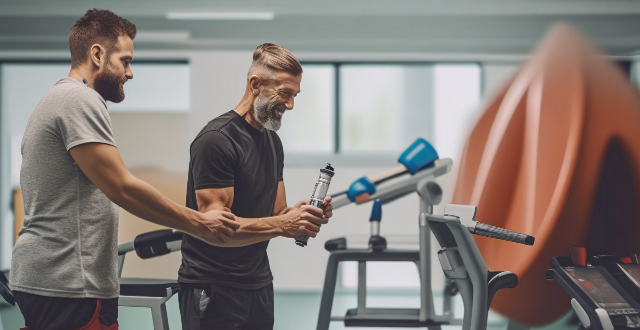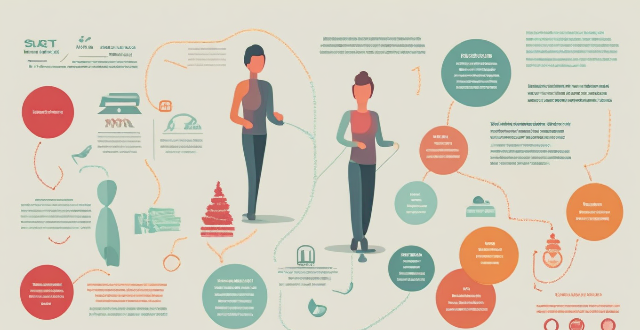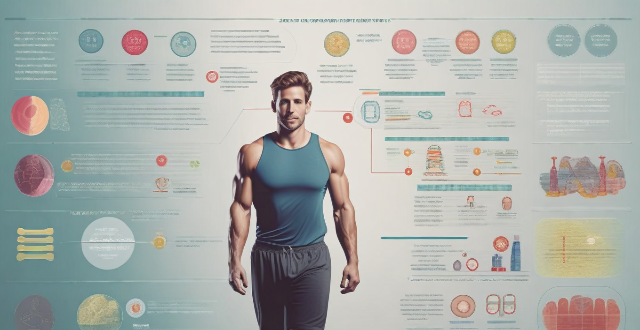Physical Self

Is there a connection between physical fitness and self-esteem ?
The article discusses the relationship between physical fitness and self-esteem, stating that engaging in regular exercise and maintaining a fit body can improve one's body image, confidence, mental health, and social interaction. In contrast, poor physical fitness can lower self-esteem by negatively impacting body image, confidence, stress levels, and leading to isolation. The author concludes that maintaining good physical fitness is essential for overall well-being and self-esteem.

How does exercise influence self-esteem ?
Exercise has a profound impact on self-esteem, positively influencing confidence, body image, and mental health. Physical benefits include weight management through fat reduction and muscle tone, as well as improved cardiovascular health and immune system function. Mental benefits include stress reduction through endorphin release and mindfulness, and enhanced cognitive function with improved memory and problem-solving abilities. Social benefits come from community building through group activities and support systems, as well as personal achievement through goal setting and feedback. Overall, regular physical activity can significantly enhance self-esteem by promoting physical, mental, and social well-being.

Can physical activity improve mental health ?
Physical activity has been found to significantly improve mental health by enhancing self-efficacy and stress self-management skills. Research shows that engaging in physical activities can lead to a sense of accomplishment, boosting an individual's confidence in their abilities, which in turn fosters better stress management and contributes to enhanced mental well-being. This relationship is particularly important for adolescents, a demographic vulnerable to mental health challenges. Future research should focus on identifying specific types of physical activities that have a greater potential to enhance these skills, guiding the development of targeted interventions aimed at improving mental health through physical activity.

Is there a link between exercise and improved self-esteem ?
This topic summary explores the relationship between exercise and self-esteem, explaining how regular physical activity can boost mental health and improve one's perception of their own worth. It discusses the types of exercise, their benefits on mental health, and evidence from research supporting the positive correlation between exercise and self-esteem. The conclusion emphasizes the importance of incorporating exercise into one's routine to enhance self-esteem.

How does physical exercise contribute to mental well-being ?
The text discusses how physical exercise contributes to mental well-being by releasing endorphins, boosting self-esteem, improving sleep quality, facilitating social interaction, and enhancing cognitive function. Regular physical activity can lead to long-term improvements in mental health, including reduced stress, anxiety, and depression, as well as better emotional stability and overall mood. Engaging in group sports or exercise classes provides opportunities for social interaction, which is essential for mental well-being, while achieving fitness goals can boost self-esteem and self-confidence. Better sleep patterns from exercise can lead to improved cognitive function and emotional regulation, while enhanced cognition may aid in the management of mental health conditions. Incorporating regular physical activity into your routine can promote mental well-being through these various mechanisms.

In what ways do sports promote self-discipline and self-control ?
Sports play a crucial role in promoting self-discipline and self-control by teaching goal setting, time management, perseverance, impulse control, delayed gratification, and stress management. These skills are essential for success in all areas of life, including personal and professional relationships, academics, and careers. By participating in sports, individuals develop valuable character traits that can lead to long-term success and well-being.

What role does self-awareness play in self-assessment techniques ?
Self-awareness is a crucial component of self-assessment techniques, helping individuals identify strengths and weaknesses, set realistic goals, enhance emotional intelligence, improve self-confidence, and foster personal growth.

How does sports participation influence self-esteem in children ?
Sports participation has a positive impact on children's self-esteem by increasing physical fitness, developing skills and mastery, promoting social interaction and teamwork, and encouraging goal setting and achievement.

In what ways do sports enhance self-esteem and confidence ?
Participating in sports can significantly boost an individual's self-esteem and confidence. Here are some ways how: 1. Achieving Goals 2. Overcoming Challenges 3. Social Interaction 4. Physical Health 5. Learning New Skills 6. Receiving Feedback 7. Leadership Opportunities 8. Competition Experience 9. Wearing Uniforms 10. Public Performance

What role do sports play in improving self-esteem and confidence ?
Sports have been recognized as a powerful tool for enhancing self-esteem and confidence. This is because they provide opportunities for individuals to challenge themselves, achieve goals, and develop a sense of accomplishment. In this article, we will explore the various ways in which sports can contribute to these positive outcomes. Firstly, engaging in sports can lead to improved physical health, which in turn can boost self-esteem and confidence. Secondly, sports can also have a positive impact on mental health by releasing endorphins that reduce symptoms of depression and anxiety. Thirdly, participating in group activities can help individuals develop communication skills and build relationships with others who share similar interests. Fourthly, achieving goals in sports can lead to a sense of accomplishment and pride that translates into other areas of life. Finally, overcoming challenges in sports can teach individuals valuable lessons about resilience and determination. Overall, sports play a significant role in improving self-esteem and confidence by providing opportunities for physical health benefits, mental health improvements, social interaction, goal setting and achievement, and overcoming challenges.

Are there any particular self-defense techniques recommended for female travelers ?
Self-defense techniques are essential for female travelers to stay safe while exploring new places. Learning basic self-defense moves, taking a self-defense class, and practicing situational awareness can help reduce the risk of becoming a victim of crime during travels. It is crucial to trust your instincts and seek help if needed.

How does sports participation affect one's self-esteem and confidence ?
Sports participation positively affects self-esteem and confidence by providing opportunities for skill development, goal achievement, positive feedback, facing challenges, overcoming obstacles, and developing a sense of mastery.

How can women build their self-confidence in the workplace ?
The text provides a summary of how women can build self-confidence in the workplace through embracing achievements, setting realistic goals, developing new skills, practicing self-care, surrounding themselves with positive influences, speaking up and owning ideas, seeking mentorship, challenging themselves, celebrating uniqueness, and learning from failure.

Can sports be a tool for personal growth and self-discovery ?
Sports offer numerous opportunities for personal growth and self-discovery, including building resilience and determination, developing teamwork and communication skills, enhancing self-discipline, promoting emotional health, discovering passion and purpose, and cultivating mindfulness and focus.

Can sports be used as a tool for personal growth and self-improvement ?
The text discusses the various ways in which sports can be used as a tool for personal growth and self-improvement. The author highlights the following aspects: - Mental toughness and resilience: Facing challenges and overcoming failure through sports can cultivate mental toughness and build resilience. - Teamwork and communication: Working together and effective communication are essential skills developed through team sports, which can enhance interpersonal relationships and group dynamics. - Discipline and time management: The structured approach required in sports can improve personal organization and time management skills, along with goal setting and strategic thinking. - Physical health and well-being: Sports contribute significantly to physical health by promoting fitness and endurance, and can also improve mental health by combating depression and anxiety. - Leadership and initiative: Sports provide opportunities for individuals to step up as leaders and develop problem-solving abilities, encouraging proactive behavior. - Self-confidence and self-esteem: Achieving mastery in sports can boost an athlete's confidence and self-esteem, fostering a positive self-image. - Adaptability and learning agility: Sports require athletes to adapt quickly to new tactics or game plans, encouraging a mindset of continuous learning that extends beyond the sporting realm. Overall, the text emphasizes that sports offer a comprehensive toolkit for personal development, encompassing benefits that extend far beyond the playing field. Engaging in sports can be a powerful catalyst for self-improvement and personal growth.

Can playing sports improve one's self-confidence and personal growth ?
Playing sports can contribute to self-confidence and personal growth by developing skills, overcoming challenges, fostering teamwork and support, promoting discipline and responsibility, encouraging goal setting and achievement, and enhancing social interaction and empathy. Incorporating sports into one's lifestyle can be highly beneficial for overall well-being and personal development.

Can regular physical activity reduce anxiety levels ?
Regular physical activity can help reduce anxiety levels by improving mood, reducing stress hormones, promoting better sleep, increasing self-esteem and confidence, and providing social support. Engaging in at least 30 minutes of moderate-intensity exercise per day can significantly reduce anxiety symptoms.

Can regular physical activity improve mental health ?
Regular physical activity can improve mental health by reducing the risk of depression and anxiety, enhancing self-esteem and cognitive function, improving sleep quality, and reducing stress. Practical recommendations for incorporating exercise into daily routines include starting small, finding enjoyable activities, setting realistic goals, making it social, incorporating strength training, staying consistent, listening to your body, and consulting with professionals.

Can regular physical activity prevent depression ?
Regular physical activity can reduce depression risk by releasing endorphins, improving sleep, and boosting self-esteem. Start with 30 minutes daily of activities like walking or swimming, and consider joining a fitness class for motivation. Gradually increase intensity and listen to your body to avoid overexertion.

How can mental training improve physical abilities in athletes ?
Mental training is crucial for athletes as it enhances physical abilities by improving focus, managing stress, and promoting a positive mindset. Techniques such as visualization, self-talk, and emotional intelligence contribute to better performance.

What is the relationship between physical literacy and child development ?
Physical literacy is crucial for child development, enhancing cognitive, social, emotional, and physical dimensions of learning. It improves memory, attention, problem-solving skills, communication, cooperation, empathy, self-esteem, resilience, muscle strength, cardiovascular health, and reduces the risk of chronic diseases. Incorporating regular physical activity into children's daily routines promotes their overall growth and well-being.

What role does physical exercise play in boosting mental focus ?
Physical exercise is not only beneficial for our physical health, but it also plays a crucial role in enhancing mental focus. Here's how: 1. Release of Endorphins: Regular exercise triggers the release of endorphins, which can help reduce stress and anxiety, leading to improved mental clarity and focus. 2. Increased Blood Flow to the Brain: Engaging in physical activities increases blood flow to the brain, delivering more oxygen and nutrients. This increased blood flow can help improve cognitive function, memory, and overall mental sharpness. 3. Better Sleep Quality: Exercise has been shown to promote better sleep quality and duration. Adequate sleep is essential for maintaining mental focus and concentration throughout the day. 4. Reduction of Stress and Anxiety: Physical activity helps lower levels of the body's stress hormones, such as cortisol. By reducing stress and anxiety, exercise allows individuals to maintain a clearer mind and stay focused on tasks at hand. 5. Enhanced Self-Confidence and Mood: Regular exercise can boost self-esteem and confidence, leading to a positive outlook on life. A positive mindset contributes to better mental focus and productivity. 6. Improved Cognitive Function: Studies have found that regular physical exercise can lead to improvements in various aspects of cognitive function, including attention, memory, and executive functions. These cognitive enhancements directly contribute to increased mental focus and concentration.

How can we promote self-care and self-love for women's mental health ?
Promoting self-care and self-love for women's mental health requires a comprehensive approach that includes creating awareness, providing resources, and establishing supportive environments. This involves understanding the importance of mental health, dispelling misconceptions, normalizing conversations, providing accessible information, offering therapeutic support, building community networks, implementing workplace initiatives, advocating for policies, encouraging mindfulness and meditation, promoting healthy lifestyle habits, and fostering self-reflection and growth. By adopting these strategies, we can empower women to take charge of their mental health and lead fulfilling lives.

What are the key self-assessment techniques for personal growth ?
Self-assessment techniques help identify strengths, weaknesses, and areas for improvement. Key methods include reflecting on past experiences, setting goals and tracking progress, seeking feedback from others, keeping a journal or diary, and practicing mindfulness and self-awareness. These techniques provide different perspectives and help individuals understand their personal growth over time.

What are some effective methods for conducting a self-assessment ?
This text discusses the importance of self-assessment for personal and professional growth, emphasizing that it helps individuals identify strengths, weaknesses, and areas for improvement. It presents three effective methods for conducting a self-assessment: 1. **SWOT Analysis**: This involves identifying one's strengths, weaknesses, opportunities, and threats. The process includes making a list of skills and qualities, identifying areas of struggle or lack of confidence, looking for growth opportunities, and recognizing external factors that may hinder progress. 2. **Reflective Journaling**: This method involves writing down thoughts, feelings, and experiences on a regular basis. It starts with choosing a journaling method, setting a schedule, and reflecting on experiences by asking questions about learning, handling challenges, and areas for improvement. 3. **Goal Setting**: This is an essential part of self-assessment that helps in identifying achievement targets and creating a plan to reach them. The steps include defining specific, measurable, achievable, relevant, and time-bound (SMART) goals, creating an action plan, and regularly tracking progress towards these goals.

What is the relationship between self-efficacy and motivation in learning ?
This article explores the relationship between self-efficacy and motivation in learning. It explains how self-efficacy affects motivation, including choice of activities, level of effort and persistence, and emotional response to setbacks. The article also provides suggestions for enhancing self-efficacy to increase motivation, such as providing opportunities for mastery experiences, modeling successful performance, offering positive feedback and encouragement, and helping students set realistic goals.

Can regular physical activity help in reducing stress and anxiety ?
Regular physical activity can help reduce stress and anxiety by promoting the release of endorphins, improving sleep quality, and boosting self-esteem. Aerobic exercises like running, swimming, or cycling are particularly effective because they increase heart rate and circulation, leading to improved oxygenation of the brain. Yoga and tai chi focus on breathing and relaxation techniques that can also help reduce stress and anxiety. The American Heart Association recommends at least 150 minutes of moderate-intensity aerobic exercise or 75 minutes of vigorous-intensity aerobic exercise per week for adults. Finding an exercise routine that works for you and that you enjoy is key to sticking with it over time.

How does sports affect the physical development of adolescents ?
Sports during adolescence positively impact physical development by enhancing muscular strength, improving bone density, promoting coordination and balance, managing body composition, benefiting cardiovascular health, and fostering mental well-being. Additionally, they encourage active lifestyle habits and social interaction, setting a foundation for lifelong health and wellness.

How does sports contribute to personal growth ?
Sports significantly contribute to personal growth by enhancing physical fitness, mental agility, emotional well-being, and life skills such as resilience, leadership, and adaptability. Regular participation not only maintains a healthy weight but also fosters discipline, self-esteem, and teamwork. Overall, sports are instrumental in developing well-rounded individuals capable of facing life's challenges with confidence and competence.

What methods do sports psychologists use to boost confidence and self-esteem in athletes ?
Sports psychologists employ various methods to boost athletes' confidence and self-esteem, including goal setting, visualization, feedback, cognitive restructuring, stress management, and social support strategies. These techniques help athletes set clear objectives, mentally prepare for competition, receive constructive feedback, challenge negative thoughts, manage stress, and feel supported by their team, ultimately enabling them to perform at their best.